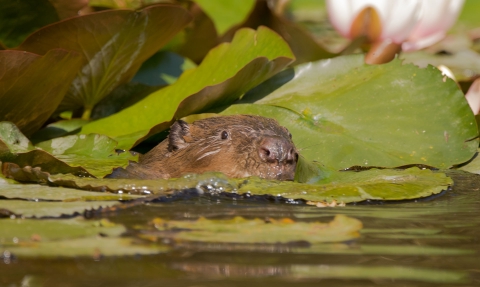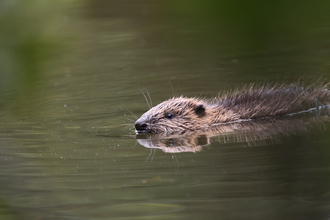
Jack Hicks
Beavers
Beavers are herbivores, feedings on a wide range of bark, shoots, leaves and roots, from riparian to aquatic vegetation.
They coppice and fell trees for food, but also to use for building materials for constructing their dams and lodges.
Beavers are back in the UK!
Eurasian Beavers were once widely distributed throughout Great Britain, but they went nationally extinct around 400 years ago due to hunting pressures. Over the past few years beaver numbers in the UK have increased and we have seen momentum gaining around returning this native species to British rivers.
We have seen licenced reintroductions in Scotland, both in the Cairngorms and Loch Lomond. We also now have beavers living in Devon’s rivers, based on the positive outcome of the River Otter Beaver Trial . There are also numerous beaver enclosures across the UK, creating benefits from beaver-created wetlands on a local scale.
We now have a number of beaver enclosures across Cornwall, including Cornwall Beaver Project .
Benefits of beavers
The 2023 State of Nature report shows that one in six species is now at risk of being lost from Great Britain. We need to act now to support our natural environment and wildlife. Research shows that beaver activities can help to boost biodiversity.
Beavers build dams to increase and maintain the water depth in their territory, which protects them from predation. There activities lead to the creation of dynamic habitat, including wetlands and standing deadwood, which numerous species benefit from.
Beaver dams provide a host of benefits for not only animals, but for people too. Beaver dams impound water and slowly release it, which helps to be more drought resilient and increases storage during times of high flow.
Biodiversity benefits
- It is widely accepted in research that beavers have an overall positive impact on biodiversity.
- Beaver activities create complex habitats that slow the flow of water and create wetlands. Slowing water flow and the collection of organic material helps to boost populations and diversity of invertebrates. This increases species abundance and is a great food source for bats, birds, and mammals.
- Through coppicing trees beavers create standing deadwood, which provides habitat for all sorts of wildlife, including the rare willow tit.
- Large, deep beaver pools can benefit aquatic and semi-aquatic species, especially amphibians that breed in still and slow-moving water, as well as being good nurseries for breeding fish.
Our vision
The Wildlife Trusts believe beavers should be allowed to return to the wild across the UK and expand their range naturally.
Cornwall Wildlife Trust want to see beavers back in Cornish rivers, where we know habitat is suitable. This is why we are currently working on a wild beaver release licence application for the catchments surrounding Helman Tor.
What are we proposing?
As part of our Rewilding Helman Tor Project we are exploring the possibility of reintroducing beavers onto our complex of nature reserves into the Par and Fowey catchments, including around our Helman Tor Nature Reserve.
Initial works has identified the site as having very suitable habitat for beavers.
We are preparing a wild release licence application to submit to Natural England. If our application is approved, this would be the first licenced wild beaver release in Cornwall and one of the first in the country.
More information on our project here.
Frequently asked questions
What is a beaver?
Beavers are the largest rodent native to Europe. They have thick brown fur, scaly tails and webbed hind-feet. Adults can measure over a metre from head to tail. They are semi-aquatic, so are adapted to a live in water and on land.
What do beavers eat?
It is a common myth that beavers eat fish. Beavers are herbivores, feeding on woody trees and green vegetation.
Do beavers fell trees?
Beavers coppice trees, which can regrow. However, in some cases, beavers will feel trees. There are trialed management options that can help to prevent this:.
More information on beaver management techniques.
Is there any training available for beaver management?
Yes. In preparation to make England beaver ready, Natural England run Beaver Class Licence Training
More information on Beaver Class Licence Training
Who do I contact if I have concerns?
Please contact the Cornwall Wildlife Trust Project Team via email or telephone: 07946 042756.

